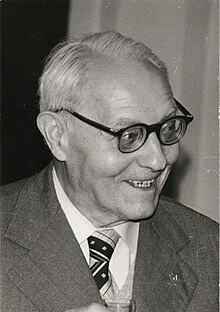Otakar Borůvka
Otakar Borůvka (born May 10, 1899 in Uherský Ostroh , Moravia , † July 22, 1995 in Brno ) was a Czech mathematician who is best known today for his contributions to graph theory , which he long before the establishment of graph theory as mathematical Discipline published.
Life

Borůvka attended comprehensive school in Uherské Hradiště before he switched to the military school in Hranice na Moravě in 1916 and later enrolled at the military technical academy in Mödling near Vienna in Lower Austria . After the end of the First World War , he graduated from the comprehensive school in Uherské Hradiště in 1918.
Borůvka first studied civil engineering at the Czech Technical University in Brno. After founding Masaryk University in 1920, he studied there with the mathematician Mathias Lerch and one year later became his assistant. After Lerch's death , Borůvka received his doctorate in 1923 under his successor Eduard Čech . Borůvka attended lectures with Élie Cartan in Paris and completed his habilitation in 1927 and became a lecturer at Masaryk University. In 1946 he was appointed full professor.
In his 1926 publication O jistém Problemému minimálním (in German About a certain minimization problem ), Borůvka described an algorithm for calculating a minimal spanning tree of an electronic network , which is now named after him ( Borůvka's algorithm ). A large part of his results in this context were later rediscovered in theoretical computer science , which is also interested in the problem of minimal spanning trees; see Prim's algorithm and Kruskal's algorithm .
Fonts
- Basics of groupoid and group theory (= university books for mathematics . Vol. 46). German Science Publishing House, Berlin 1960
- Linear differential transformations of the 2nd order (= university books for mathematics. Vol. 67). German Science Publishing House, Berlin 1967
Web links
- Literature by and about Otakar Borůvka in the catalog of the German National Library
- Literature and other media by and about Otakar Borůvka in the catalog of the National Library of the Czech Republic
- Otakar Borůvka in the MacTutor History of Mathematics archive
- Otakar Boruvka: Czech mathematician of world importance, university educator at brno.cz
| personal data | |
|---|---|
| SURNAME | Borůvka, Otakar |
| BRIEF DESCRIPTION | Czech mathematician |
| DATE OF BIRTH | May 10, 1899 |
| PLACE OF BIRTH | Uherský Ostroh , Moravia , Austria-Hungary |
| DATE OF DEATH | July 22, 1995 |
| Place of death | Brno , Czech Republic |
